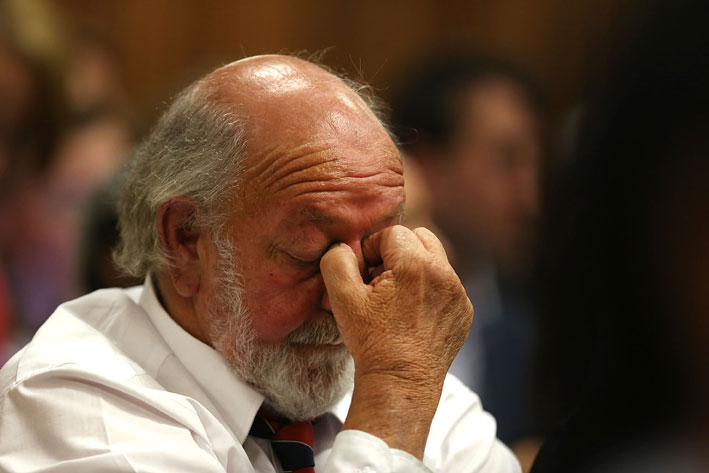The father of Reeva Steenkamp told a crowded courtroom on Tuesday that although he had forgiven Oscar Pistorius, who was convicted of his daughter’s 2013 murder, the former athlete should pay for what he has done.
In emotional testimony in the Gauteng high court in Pretoria on the second day of a sentencing hearing, Barry Steenkamp described how his family had been devastated by the killing of the law graduate and model.
“I think of her every day. I talk to her. It is difficult to explain. What happened devastated us. I wouldn’t wish that on anybody in the world,” Steenkamp, 73, said.
Many wept during the testimony. Pistorius, who faces up to 15 years in prison, sat with his head in his hands, crying. Relatives of the disgraced athlete were present in court, along with the Steenkamp family.
Pistorius won global fame and fortune as a Paralympic athlete and became the first double-leg amputee to participate in the Olympics, reaching the semi finals of the 400m sprint in London 2012. He landed a series of lucrative sponsorship deals with major brands, and was branded the “blade runner”, a reference to the carbon fibre prosthetics he used to compete.
But the fairytale ended when the 29-year-old, whose lower legs were amputated when he was 11 months old, shot dead his girlfriend on 14 February 2013, claiming he thought she was an intruder.
The case has gripped south Africa and prompted intense global interest.
Pistorius was convicted of manslaughter in 2014 but the conviction was upgraded to murder last year after an appeal by state prosecutors. The minimum sentence for murder in South Africa is 15 years, however legal experts say Judge Thokozile Masipa has considerable powers of discretion.
With his hands shaking and voice trembling, Steenkamp described the moment he learned of his daughter’s death and the intense pain of bereavement.
“Ever since Reeva’s death I have spent my time on my veranda, at two or three in the morning. I smoke my cigarettes. I think of Reeva every day, every day of my life, morning, noon and night … I talk to hear every day in my head … my daughter,” he told the court.
Steenkamp, a horse trainer, said he had pushed his diabetes needles into his own stomach and arms to try to feel some of the pain she must have felt.
Earlier in the day, Ebba Guðmundsdóttir, a celebrity chef and author from Iceland, described how Pistorius had become a family friend after he heard her son suffered the same disability.
The athlete had reached out to Guðmundsdóttir after being told of the boy’s condition by a journalist in contact with her mother and had visited the family frequently. She described how, having won a gold medal in Manchester, Pistorius ran into the crowd to hang it around her son’s neck.
“It was a very lovely gesture,” Guðmundsdóttir said.
Much of the legal argument around the killing has centred on whether Pistorius knew his girlfriend, who was 29 when she died, was in the toilet when he opened fire through the door. The former athlete has repeatedly said he thought an intruder who had broken into the home was hiding in the cubicle.
Barry Steenkamp described his daughter’s plans to look after her parents in their old age when she returned to practise law after her a modelling career. He was not aware of her relationship with Pistorius, though he spoke to his daughter weekly.
Asked to describe the events of the night of the killing, Steenkamp said “he thought there was an argument” before being gently stopped by leading prosecution lawyer Gerrie Nel.
“What she must have gone through in those split seconds. She must have been in so much fear and pain. That is what I think of all the time. I can see it myself. It must have been absolutely and utterly awful,” Steenkamp said.
Barry Roux, leading the defence team of Pistorius, did not question Steenkamp, saying only: “We understand and we are very, very sorry. Whatever we do and say it cannot bring her back.”
Steenkamp explained that he had felt unable to accept previous requests from Pistorius to meet or talk. Addressing the former athlete directly, he said that the “time would come”.
“I would like to talk to you, Oscar. But not now, not here. I would like to talk to you,” he said.
When he was convicted for manslaughter, Pistorius received a sentence of five years. He was released on bail after 10 months and has been living under effective house arrest at the luxurious Pretoria home of his uncle.
Legal experts say it is extremely unlikely that the former sportsman will be able to challenge the sentence he receives following this week’s hearing. But he might be able to apply for medical parole, once sentenced.
On Monday, the court heard from a psychologist who said Pistorius was suffering serious depression, anxiety and post-traumatic stress syndrome.
“His spirit is broken. If he was my patient I would admit him to hospital,” Prof Jonathan Scholtz said.
But prosecutor Nel said Pistorius has shown no remorse for killing Steenkamp and was depressed because he felt sorry for himself.
Charlotte Mashabane, an assistant health manager at the prison where Pistorius was held for a year, told the court on Tuesday he “threw tantrums” while in prison and she felt threatened by him.
Steenkamp said on Tuesday that, as Christians, he and his wife June, who was in court, had forgiven Pistorius.
“For me it has been difficult to forgive, but I feel that Oscar … has to pay. We will go by the decision that the court hands down to Oscar. I don’t want to say that he has to go to the maximum … But he has to pay for it,” he said.
The hearing, set for four days, continues.

